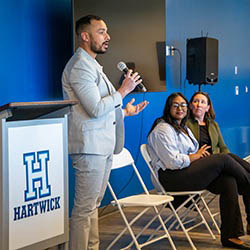Bassett Healthcare Network and Hartwick College have a long history of partnership in higher learning for nursing and nursing education students. In the late 1940s, Bassett established a four-year nursing program, with two years of didactic training at Hartwick College, followed by one year of practical training at Bassett Medical Center in Cooperstown, and nine months of training at Columbia University in New York City.
As a way of dealing with the ongoing nursing shortage in rural areas, Bassett’s Partnership for Nursing Opportunities (PNO) was created in 2001 as a joint venture with Hartwick College and SUNY Delhi. The program allowed nurses to pursue an associate or bachelor’s degree while continuing to work, with Bassett paying the tuition in full. Graduating nurses committed to one year of full-time employment within the Bassett system for each year of tuition support. By 2011, the PNO program had helped more than 100 nurses earn RN degrees from SUNY Delhi or BSN degrees from Hartwick College. Many chose to stay within Bassett Healthcare Network after fulfilling their PNO obligation.
In 2018, Bassett and Hartwick created the Academic Practice Partnership, which began offering simulation labs to registered nurses completing their Sexual Assault Nurse Examiner (SANE) education. This partnership has evolved to include a variety of new educational offerings to Bassett employees and to create pathways to increase the number of registered nurses practicing in the Bassett Healthcare Network. Bassett and Hartwick are launching simulation labs with first-year Bassett medical and surgical residents and nursing students, as well as exploring ways to expand the SANE learning experience through simulation.
The U.S. Bureau of Labor Statistics reports that 190,470 registered nurses were employed in New York State as of May 2022. Employment of registered nurses is projected to grow six percent from 2021 to 2031. Nationwide, about 203,200 openings for registered nurses are projected each year, on average, over the decade. Many of those openings are expected to result from the need to replace workers who transfer to different occupations or exit the labor force.
This seemingly perpetual shortage is exacerbated by the shortage of nursing educators. According to Hannover Research (2018), “Faculty shortages severely limit nursing schools’ abilities to accommodate incoming students and thousands of qualified applicants are turned away from both baccalaureate and graduate programs. This places additional strain on the healthcare field where demand for professional registered nurses continued to grow.”
“In a field as dynamic as nursing, we are committed to educating the educators, and equipping our nurses with ongoing opportunities to increase their knowledge,” said Angela Belmont, DNP, RN, NEA-BC, Senior Vice President and Chief Nurse Executive at Bassett Healthcare Network. “This opportunity to learn and grow benefits not only Bassett employees, but our patients and our communities as well.”

